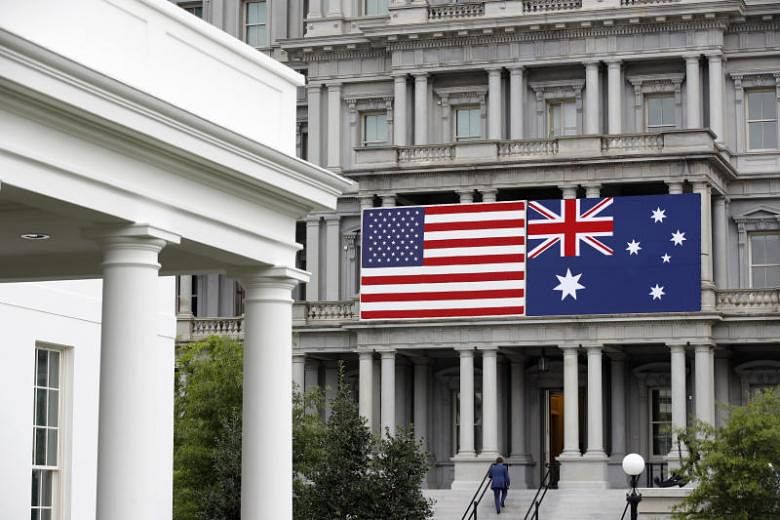SYDNEY - At the first meeting between Australian Prime Minister Scott Morrison and United States President Donald Trump late last year, the latter appeared to show little interest, aside from asking about Australia's regular change of leaders.
But much has changed in the past 10 months.
Mr Morrison will on Thursday (Sept 19) begin an unusually long trip to the US - an eight-day visit which will include a rare State Dinner. The only other leader to have received such an honour from Mr Trump was French President Emmanuel Macron.
Mr Morrison's visit will include a trip, accompanied by Mr Trump, to Ohio to visit a new Australian-owned paper recycling mill. He will also meet senior figures in the administration, including Vice-President Mike Pence, Secretary of State Mike Pompeo and Secretary of Defence Mark Esper.
For Mr Morrison, the trip appears designed to demonstrate that Australia remains firmly committed to its ties with the US, its closest ally.
Despite questions about the US commitment to supporting allies in Asia Pacific, particularly under Mr Trump, Mr Morrison has signalled that he intends to try to keep Washington engaged with the region.
"There are a lot of tensions globally and the US is our biggest and greatest ally and a very important partner," Mr Morrison told Channel Seven on Wednesday. "We can never take our relationship with the United States for granted… I take it seriously and it is bigger than Prime Ministers and Presidents, it's about our people, it's about our shared values."
Similarly, Mr Trump has shown unusual warmth towards Australia, despite a previous terse exchange with former prime minister Malcolm Turnbull over a refugee swap deal.
Mr Trump seemed to be particularly impressed by Mr Morrison's surprise election win in May. Like Mr Trump in 2016, Mr Morrison had been widely tipped by pundits and pollsters to lose.
"He didn't surprise me, but he surprised a lot of people," Mr Trump said after they met in June in Japan.
Mr Morrison has also shown stronger support for Mr Trump's position in the trade war with China than most other world leaders. And he has committed Australian troops to join a US-led coalition to protect shipping from Iran in the Strait of Hormuz, just the third country to do so after Britain and Bahrain.
Importantly, Australia has a trade deficit with the US and is therefore immune from Mr Trump's claims that countries such as China, which are large exporters to the US, are "ripping us off". Australia is also lifting its defence spending to 2 per cent of GDP.
But it has not joined American freedom of navigation patrols to contest Chinese claims in the South China Sea and has resisted the Cold War-style anti-China rhetoric emerging from Washington.
Some analysts have urged Mr Morrison to use his time with Mr Trump to speak candidly about China and to encourage Washington to avoid seeking to contain Beijing.
Foreign affairs commentator Tony Walker wrote in The Sydney Morning Herald that Mr Morrison should "use whatever leverage he has with his host to persuade him to make a trade deal with China that will not involve a loss of face on the Chinese side".
Executive director of the Australian Strategic Policy Institute, Mr Peter Jennings, said Mr Morrison should offer ways to boost security cooperation with the US to try to cement continued US engagement in the region.
"The challenge for Morrison is to show how Australia adds material value to US security in the Indo-Pacific," he wrote in The Australian. "Looking and acting like rent-seeking European allies would be disastrous in this context."
Others noted that Mr Trump is notoriously unpredictable and Mr Morrison will need to tread warily.
The visit comes amid heightened tensions between the US and Iran, which could interfere with Mr Morrison's itinerary and overshadow his trip.
Asked whether Australia would support a US call for action against Iran, he said on Wednesday: "It's very premature and none is being asked for."


